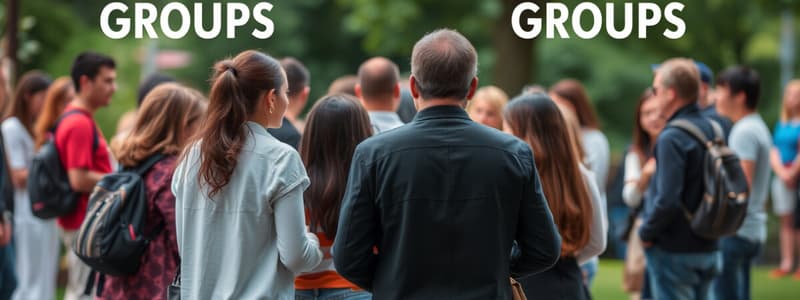Podcast
Questions and Answers
What is a group?
What is a group?
At least two people who have one or more goals in common and share common ways of thinking and behaving.
What is a social category?
What is a social category?
People who share a social characteristic.
What is a social aggregate?
What is a social aggregate?
People temporarily in the same place at the same time.
What constitutes a primary group?
What constitutes a primary group?
What are primary relationships?
What are primary relationships?
What defines a secondary group?
What defines a secondary group?
What are secondary relationships?
What are secondary relationships?
What is a reference group?
What is a reference group?
What is an in-group?
What is an in-group?
What is an out group?
What is an out group?
What is a social network?
What is a social network?
What does cooperation entail?
What does cooperation entail?
What is conflict in social terms?
What is conflict in social terms?
What is social exchange?
What is social exchange?
What is coercion?
What is coercion?
What does conformity mean?
What does conformity mean?
What is groupthink?
What is groupthink?
What is a formal organization?
What is a formal organization?
What is bureaucracy?
What is bureaucracy?
What does power refer to in a social context?
What does power refer to in a social context?
What is authority?
What is authority?
What does rationalization mean?
What does rationalization mean?
What is an informal organization?
What is an informal organization?
What is the iron law of oligarchy?
What is the iron law of oligarchy?
Study Notes
Key Concepts of Groups in Sociology
- Group: At least two individuals sharing common goals and thought patterns.
- Social Category: Individuals sharing a specific social characteristic.
- Social Aggregate: People in the same location at the same time, without any specific social relationship.
Types of Groups
- Primary Group: Comprised of emotionally close individuals who know each other well and value each other's company.
- Primary Relationships: Characterized by intimate, personal, and caring interactions that provide fulfillment.
- Secondary Group: Consists of members who interact on a more superficial level, focusing primarily on specific tasks or goals.
Relationship Dynamics
- Secondary Relationships: Involve impersonal interactions that touch upon limited aspects of individuals' personalities.
- Reference Group: Utilized for self-evaluation and shaping personal attitudes, values, beliefs, and norms.
In-Group vs. Out-Group
- In Group: An exclusive social entity that requires strong loyalty from its members.
- Out Group: A social group that faces opposition or competition from the in-group.
Social Dynamics and Interactions
- Social Network: A web connecting individuals to varying groups and other people through social relationships.
- Cooperation: Collaborative efforts between individuals or groups aiming to achieve shared objectives.
- Conflict: Engagement intended to overcome an opponent.
Social Behavior and Structure
- Social Exchange: Voluntary actions undertaken with the expectation of receiving rewards.
- Coercion: Imposing behaviors through pressure or force upon individuals or groups.
- Conformity: Aligning behavior with group norms and expectations.
- Groupthink: Flawed decision-making arising from group pressures that promote conformity.
Organizational Structures
- Formal Organization: A group established purposefully to meet long-term goals.
- Bureaucracy: A structured organization prioritizing rational operations and efficiency.
- Informal Organization: Emerges within a formal organization, governed by personal relationships and unwritten norms.
Power and Control
- Power: The capacity to influence or control others' behaviors.
- Authority: Recognized or socially accepted power utilized legitimately.
- Rationalization: A mindset focusing on logical reasoning, knowledge, and meticulous planning.
Theoretical Frameworks
- Iron Law of Oligarchy: Suggests that power tends to concentrate in a select few within any organization over time.
Studying That Suits You
Use AI to generate personalized quizzes and flashcards to suit your learning preferences.
Description
Test your knowledge on the key concepts of primary and secondary groups from Sociology Chapter 6. This quiz covers important terms and definitions related to group dynamics and social categories. Perfect for students looking to reinforce their understanding of these fundamental sociological concepts.




